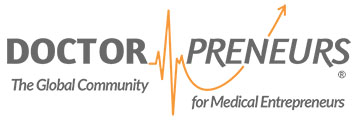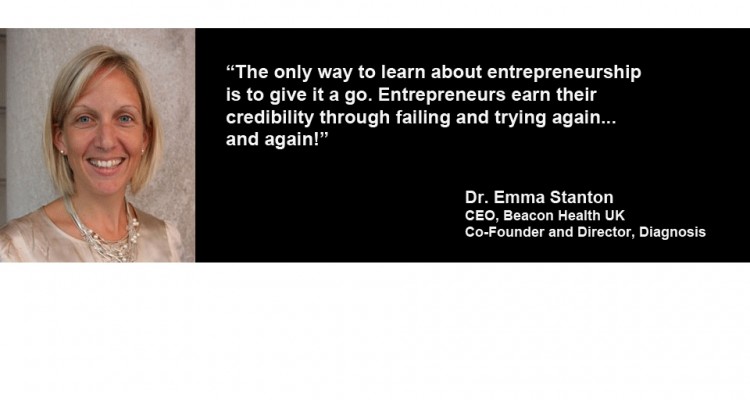Interview with Dr Emma Stanton: Psychiatry SpR, Director of Diagnosis and CEO of Beacon UK
 Recently returned from the USA as a Commonwealth Fund Harkness Fellow at Harvard University, Dr Emma Stanton BM MRCPsych MBA is now CEO of Beacon UK – an innovative managed mental healthcare company as well as a part-time Psychiatry Specialist Registrar at South London and Maudsley NHS Foundation Trust. Previous roles include Clinical Advisor to the Chief Medical Officer, core member of the National Leadership Council, Advisor to Bupa, co-editor of “Clinical Leadership: Bridging the divide” (2009) and co-author of “MBA for Medics” (2010). A recipient of NHS London’s Prepare to Lead Scheme, Emma is also an associate of the Institute for Strategy and Competitiveness at Harvard Business School and Director and co-founder of Diagnosis, a clinical leadership social enterprise.
Recently returned from the USA as a Commonwealth Fund Harkness Fellow at Harvard University, Dr Emma Stanton BM MRCPsych MBA is now CEO of Beacon UK – an innovative managed mental healthcare company as well as a part-time Psychiatry Specialist Registrar at South London and Maudsley NHS Foundation Trust. Previous roles include Clinical Advisor to the Chief Medical Officer, core member of the National Leadership Council, Advisor to Bupa, co-editor of “Clinical Leadership: Bridging the divide” (2009) and co-author of “MBA for Medics” (2010). A recipient of NHS London’s Prepare to Lead Scheme, Emma is also an associate of the Institute for Strategy and Competitiveness at Harvard Business School and Director and co-founder of Diagnosis, a clinical leadership social enterprise.
Emma will also be contributing regular articles to the site and you might like to check this feature on entrepreneurship which she recently wrote for the MIT Entrepreneurship Review. In addition, you may be interested in the forthcoming course that she has designed along with colleague Claire Lemer, Medics mini MBA.
You have a number of interesting responsibilities and roles, in addition to your clinical work. Can you talk about those and how you divide up your time and fit everything in?
My current role involves 1 day a week clinically as a Psychiatry Specialist Registrar at St Thomas’, completing my CCT as a Flexible Trainee. The remainder of my time is as CEO for Beacon UK and Europe Ltd, setting up the UK operations for Beacon Health Strategies LLC, an American managed mental health care company.
Additional roles include being a Director of Diagnosis, a clinical leadership social enterprise I founded with my colleague Dr Claire Lemer in 2009. Diagnosis creates opportunities for medical students and junior doctors to gain leadership and policy experience alongside their clinical training. Following my year in Boston as a Commonwealth Fund Harkness Fellow, I am also an Associate of the Institute for Strategy and Competitiveness at Harvard Business School with Professor Michael Porter.
Your roles certainly seem tremendously varied! Can you talk a little about the career path you’ve taken and what has motivated you to make those choices along the way?
From 2005 – 2006, I circumnavigated the world in a 68-foot racing yacht. I was Watch Leader on the British boat as part of the Clipper Round the World Yacht Race. Although I had been a doctor for several years before sailing round the world (I graduated in 2000), this year taught me more about teamwork, leadership and the importance of good communication than anything during my medical training.
On my return to clinical work, I wanted to learn more about how systems and organisations work, to understand how I could play a broader role improving health care. With this in mind, I completed an Executive MBA at Imperial College Business School from 2007 – 2009. During this time, I also had the opportunity to participate in 2 prestigious schemes that introduced me to a cohort of like-minded doctors, all interested in playing a role in the future of the NHS. The first of these was the NHS London “Prepare to Lead” scheme, a mentoring program, set up by Mr Oliver Warren. The second was the Chief Medical Officer’s Clinical Advisors Scheme, now called Medical Director’s Clinical Fellows Scheme.
I am passionate about improving the NHS but keen to learn more about how other health care systems operate and that was what led to my application to be a Commonwealth Fund Harkness Fellow from 2010 – 2011. While in Boston, I was introduced to Beacon Health Strategies, a clinically led and data-driven mental health care company. This led to the opportunity to take on my current role as CEO of Beacon UK, alongside completing my clinical training.
Do you see a need to train medics in business skills and if so, how do you think this would best be achieved?
In the current economic context it is clear there is a need for medics to be more financially literate. One way this could be achieved is through encouraging trainees and medical students to look at the financial implications of their clinical audit and quality improvement projects, alongside measuring clinical impact on patient outcomes. Focusing on improving value (measured by outcomes over cost) is core to the principles of value-based health care delivery.
You’ve got an MBA. What do you feel are the potential benefits to medics of gaining a formal business qualification such as an MBA?
Medics do MBAs for many different reasons. I enjoyed my MBA and learnt a great deal – but I don’t think it is a necessary qualification for medics who wish to take on leadership roles. An MBA is expensive financially and a significant time commitment. However, it is an incredibly efficient way to learn about all the different functions of an organisation – many of which are foreign to clinical training – such as entrepreneurship, economics and finance.
There is currently an increasing recognition amongst leaders in the NHS that we need to encourage innovation within our healthcare service. What do you think needs to happen to ensure more medics are able to get involved in such innovation and take their ideas forward?
I am skeptical that the word “Innovation” has been rather abused by NHS. It feels more likely to represent “cuts” in funding, rather than support of genuine innovation. To involve more medics, we need to make it accessible, fun, relevant for improving patient care and competitive for participants. “Dragons Den” principles, using real money, as took place recently in the North-West; this was a great example of how this could be done in an NHS context.
What would be your advice to medics who are curious about healthcare entrepreneurship and innovation and thinking of getting involved?
The only way to learn about entrepreneurship is to give it a go. This is how entrepreneurship is taught at business schools. Entrepreneurs earn their credibility through failing and trying again, and again! So don’t be put off if your first idea isn’t a huge success. Your next one might be.
Can you recommend some useful organisations and resources out there for medics who are seeking further information and support in this area?
Look up www.diagnosisltd.co.uk. Also, seeking a formal mentor can be invaluable in navigating a non-traditional medical career.
So, what’s next for you career-wise?!
My immediate goal is to build the UK business for Beacon; working in partnership with the NHS to improve mental health care delivery and outcomes for patients. This is an exciting opportunity but not an easy one. Longer term, I am keen to continue practising clinically one day a week for as long as I can and to expand Beacon’s operations internationally. And I am sure there will be another book at some stage…
Follow Emma on twitter: @doctorpreneur
Follow Diagnosis and Beacon UK: @diagnosisltd and @beaconuk

